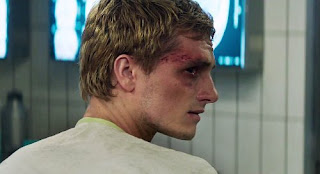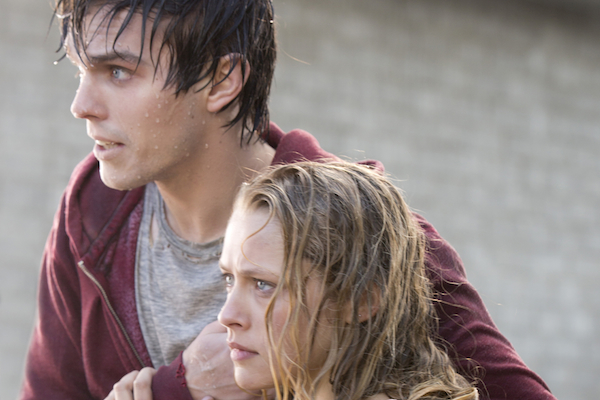I've been thinking a lot lately about the apocalypse. Or rather, I've been thinking about thinking about the apocalypse. It seems like so much of our popular culture at this point revolves around the destruction of the world, the end of the human race, the desolation of, well, everything. Like we're staring down the barrel of a gun and all we can do to distract ourselves is imagine all the different guns we might look at instead.
I've been thinking about the apocalypse and I've been trying to wrap my head around why I like some movies and stories that deal with it, and why I hate a lot of other ones. It's baffling, right? Some stories make me roll my eyes and casually dismiss the writer as a weirdo with survivalist fantasies, while others make me want to die inside, but then there are those stories that make my soul to sing. The ones that talk about the end of the world but that resonate with something so deep inside me I can't really name it, and which I go to see four times in theaters, drag everyone I know, and think about before I fall asleep at night.
What makes those ones different? What makes for a good apocalypse story? And why the hell do I love Pacific Rim and Mad Max: Fury Road so much while other people pass them off as being "mostly entertaining" and "good, if you like popcorn fluff." Why do these movies speak to my soul but barely do more than amuse the vast majority of people?
The answer, I think, is hope.
 See, when I think about the apocalypse, I don't get excited about how I'll survive. I don't fantasize about leading a crew through some broken down city, fighting off monsters. I don't even really think I'd live long at all. As I've said before, if it's a choice between my survival and someone else's, I like to think I'd die well and with dignity. But mostly I just figure I'd die quickly.
See, when I think about the apocalypse, I don't get excited about how I'll survive. I don't fantasize about leading a crew through some broken down city, fighting off monsters. I don't even really think I'd live long at all. As I've said before, if it's a choice between my survival and someone else's, I like to think I'd die well and with dignity. But mostly I just figure I'd die quickly. I find your average apocalypse film to be unremittingly bleak. Movies about the end of the world and a humanity not worth saving. I've been asked before why I don't write about The Walking Dead or films like 28 Days Later or I Am Legend. The truth is, I don't write about them because I don't like them. I have trouble watching them. They bother me.
Which is hilarious, considering that I regularly fall asleep to Criminal Minds marathons and have stated before that I find Band of Brothers "soothing".
But it's true. I find those movies, though not really substantially different from other apocalypse films, deeply disturbing. And I think it really comes down to perspective. Both my perspective and the perspective of the filmmakers.
I wouldn't call myself much of an optimist about human nature, but I wouldn't say I'm a pessimist either. And the word "realist" generally seems like a cop-out. I'm not sure how to categorize myself, but the basic fact is that I don't think humanity is any better or worse today than it was yesterday. We're not getting any better, but we're not getting any worse either. Humanity is what it is. Flawed, capable of greatness, and inclined to go its own way and commit great evil. We are rebellious children, and we act like it. We always have.
So I find any narrative that assumes the end of times comes as a result of human avarice or stupidity or stubbornness to be entirely believable. And I don't tend to have a huge problem with the stories that have us facing off against some extinction level threat that comes from the outside, either. Those both make sense to me. I can imagine a humanity facing those situations.
What I can't really stomach are stories that tell unbalanced narratives from there. I find versions of the apocalypse where everyone is kind and sweet and bands together to save the world to be patently false, but I also find the stories where all people are scum and the world can never hold together because we're too horrible to be unbearably cynical.
I need a mix. I need a story where the world is terrible and people are awful but there's hope to be had. A world that is in dire straits but that can be redeemed. Exhumed.
In other words, my favorite apocalypse movies are the ones that have hope for our future as a human race. Not unreasonable hope, not films that demand we completely change who we are, but movies and books and television shows that admit our failings and beg us to do better.
I love Pacific Rim because it's all about fractured, flawed people working together to save the world. The whole premise of the film rests on the idea that no one can save the world by themself. No one is strong enough alone. But together we can do something amazing. Together we can make a difference. And yes, we'll have to work hard and submit to the people who know better than we do. There's no room for ego in a struggle like this. But there is goodness and value in humanity, if only we have the courage to find it.
I fell in love with Mad Max: Fury Road for much the same reasons. It's a story where the dominant societal structure is one that reduces people to things, and it's only by taking back their agency that our heroes can begin to build a healthy society. It's only by recognizing themselves as human and then using their humanity to help others that they can achieve anything at all. If we work together we can do great things, but if we use others we degrade ourselves as well.
Snowpiercer is brutal and devastating and so depressing most of the time, but it ends on the idea that even from great destruction and such loss of hope, there can be a spark that leads to change. Sacrifice and genuine love can give way to a new world, if we're willing to risk everything we have.
Terminator 2: Judgment Day? It's all about how we can't rely on predictions of the future that tell us who we will be. We must be determined to make our own path, to veer away from war and to choose the harder way of peace. We have to give up our ideas of what it means to make a good world, and really think about what makes a world good at all. And sometimes we have to give up ourselves in order to let the new world be born.
Warm Bodies saves the world with love and understanding. The 100 is about humanity struggling to remain worth saving. The Hunger Games addresses issues of real political change by asking if the system we are creating is any better than the one we are replacing. Matched reminds us of the value of art and beauty in the restoration of the world. And even The Last Battle ends with the promise of a garden that goes "higher up and deeper in".
They're all about hope, these stories. Every single one of them. Oh sure they wear the clothes of the apocalypse, and they wear them well, but these stories aren't about the end of the world, they're about the start of a new one. And that's what I love about them.
I don't want to know how the world ends. If I can't do anything to stop it, then I feel no pressing desire or urge to know when it will happen or what I could do. It's why I hate natural disaster movies and films about the "inevitable" happening. If it's inevitable, why bother thinking about it at all?
I don't care how the world ends. I want a story about the world beginning.
I want stories about the world made right in a new society. I want narratives about people banding together to help each other. Yes, there's still problems and those problems need to be addressed, but I want to see us thrive. I want an ideal. I couldn't care less how it happens, I just want to know that we can find a way forward.
So I guess you could say that my biggest problem with apocalypse movies is that they're about the apocalypse at all. I don't want tales of the inevitable end of everything, I want to know how we persevere. I want to know how humanity changes.
I want to believe that there's redemption in it. That my hope, marred though it is by my damned practicality, can be fully realized someday.
It's why I love Star Trek and get so angry when someone (like, say, JJ Abrams) puts it down. Yes, Star Trek is painfully idealistic and preachy. So am I. And I know that there's nothing really logical or practical about the future it imagines. But oh what a future to imagine.
We need dreams more than we need prophecies of doom, especially right now. Admittedly, like I said before, I really don't think we're any closer to destruction than we've ever been. We have nuclear weapons now, but they used to have smallpox and the bubonic plague. The world has always teetered on the edge of disaster. That's normal.
What's new is how capable we are of telling stories about it, and that's what I think we need to be wary of. I might disagree with how strongly they said it, but Tomorrowland had a point when it said that all of our movies and shows and books about the end of the world might just be so much self-fulfilling prophecy. What we need now is hope. The hope that there is a better world out there, and that through sacrifice and work and the agony of crushed dreams, we could build it together.
When it comes down to it, I don't want to know about the apocalypse. I want to know what happens next.






KOLKATA ESCORTS
ReplyDeleteKOLKATA ESCORT
KOLKATA ESCORT SERVICE
KOLKATA INDEPENDENT ESCORTS
KOLKATA INDEPENDENT ESCORT
ESCORT IN KOLKATA
ESCORTS IN KOLKATA
VILLAGE CALL GIRLS
VILLAGE CALL GIRL
CALL GIRL
CALL GIRLS
ESCORT
ESCORTS
KOLKATA FEMALE ESCORTS
KOLKATA HOTEL ESCORTS
KOLKATA MODEL ESCORTS
KOLKATA CALL GIRL
KOLKATA CALL GIRL SERVICE
KOLKATA CALL GIRL SERVICE
KOLKATA CALL GIRLS
CALL GIRL
CALL GIRLS
CALL GIRLS SERVICE
CALL GIRL SERVICE
KOLKATA INDEPENDENT CALL GIRLS
KOLKATA INDEPENDENT CALL GIRL
ESCORT
KOLKATA ESCORTS
KOLKATA ESCORT
KOLKATA ESCORT SERVICE
KOLKATA INDEPENDENT ESCORTS
KOLKATA INDEPENDENT ESCORT